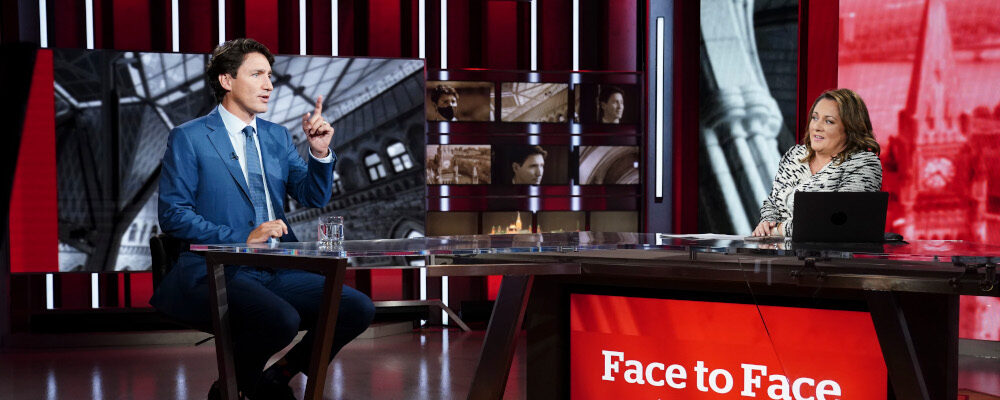Pierre Poilievere wants to defund the CBC. Not all of it, just English TV and the English news network. He proposes to keep the French services and English radio intact. In his fundraising ads, he says “Send me $20 and I will save you a billion”. His math is poor, but his attack is sophisticated.
The possible savings are not even close to a billion. The news network finances itself from cable fees and advertising. There are no government dollars involved. As for the billion dollars of public subsidy (1.25 actually), it is traditionally split 60/40 English/French and 80/20 TV/ radio, so there is only 750 million for English services, of which 20 percent goes to radio. Thus, there are only 600 million dollars spent on English TV, not the billion Poilievre claims.
Although not good at math, Poilievre’s approach is clever. Unlike his predecessors, he does not attack CBC/Radio-Canada as a whole, just English TV. Why? Because it’s the weakest of all the services. Radio-Canada’s TV service, Ici Tele, has a 25 percent prime-time share, Ici Radio 17 percent, English radio 17 percent, and English TV 5 percent. English TV’s audiences have been shrinking for more than a decade. It is now a service with almost no viewers and what it has skews very old.
As audiences collapse, so does public support for the service. This is not particularly surprising. Why would Canadians care about or want to protect English TV when it no longer matters in their lives? Why spend their political capital on a service that is irrelevant to them?
The problems of English TV are not new. At the beginning of this century, its share of prime time had been in decline for 30 years. In 2004, its share had fallen to the lowest level ever. There was considerable despair about whether it could be revived.
Beginning in 2005, a new strategy was put in place based on making Canadian shows that Canadians wanted to watch. This was considered a radical and likely impossible undertaking. There were also fears that CBC would be “dumbed down”. The strategy was inspired by the BBC’s famous assertion: “Audiences are everything to us”. (Full disclosure: I was the head of English TV at the time.)
The strategy had two components. First, it was necessary to get rid of the shows that nobody was watching. The performing arts block (essentially ballet on TV) was eliminated; the coverage of increasingly obscure arts awards was ended (everything from the Urban Music Awards to the Gillers); and the historical documentaries masquerading as drama (endless Canadian political figures from the deep past) were dumped. The rule was simple: if nobody is watching a show, it must go.
Second, new shows were commissioned that respected the TV conventions that English Canadians preferred. A long parade of hits began: Little Mosque on the Prairie, Heartland (now into season 16 and still on the network), Dragon’s Den (now in its 17th. season), Battle of the Blades (that would garner an incredible 3 million viewers), The Rick Mercer Report, on and on. The new shows dramatically lifted English TV’s audiences. Its all-Canadian prime-time lineup made it the number two network in the country behind only CTV’s largely all-American schedule.
As the audiences improved, Canadians’ impression of English TV improved. In survey after survey, Canadians said that they valued it more, that it was more distinct, and that it was essential to them personally. Interestingly, morale within the corporation also improved. In 2006, only 41 percent had been optimistic about the future of the CBC; by 2010, the number had climbed to 74 percent.

The falling audiences of English TV have no doubt dramatically eroded Canadians’ confidence in the network. Unfortunately, the CBC does not report Canadians’ attitudes to the different services, service by service. Rather it rolls up Canadians’ attitudes across all services, including the very popular French ones and English radio. It is impossible to imagine, however, that Canadians’ support for English TV has not vanished as its audiences have disappeared.
Pierre Poilievre’s polling doubtless shows this. That is why his focus is on the part of the CBC that is weakest and most vulnerable. He has no fundraising ads in Quebec, urging French Canadians to give him money to defund Radio-Canada.
The sad truth is that Pierre Poilievre may be right. Perhaps it’s time to eliminate English TV. What is the point in maintaining all of its infrastructure, personnel, and unwatched shows if nobody cares? Perhaps it’s time to try something new. If the CBC were a normal corporation with multiple product lines, where one was failing and the others were strong, that is exactly what would be done.
The alternative to Poilievre’s suggestion would be to take the $600 million spent on English TV and not return it to the public purse. Instead, it could be spent on creating a digital on-demand service, featuring the best Canadian documentaries, dramas, kids’ shows, and comedies. Like Netflix or Disney Plus, the shows would be streamed and available to Canadians whenever they wanted to watch them.
It’s worth noting that the $600 million would trigger much more than $600 million worth of production. The new service would presumably have access to the Canadian production subsidies (the tax credits, the Canadian Media Fund, and the coproduction treaties), which would easily raise the amount of new money entering the system to more than a billion dollars. To put this amount in perspective, the total expenditure on Canadian entertainment shows in 2021 was not quite $570 million.
This would be a colossal shot in the arm for Canadian TV production, at a time when the money committed by the private sector to Canadian entertainment shows has been falling year over year for many years. It would also constitute a new beginning for English television, one which might not only save the network from irrelevance but also position it to make a major, future contribution to Canadian culture.




